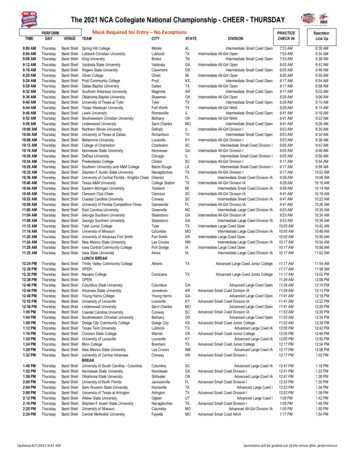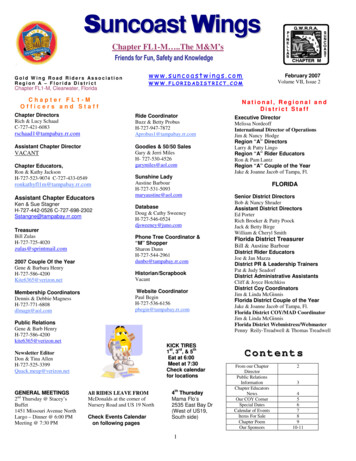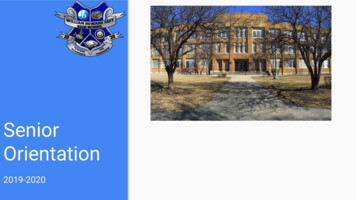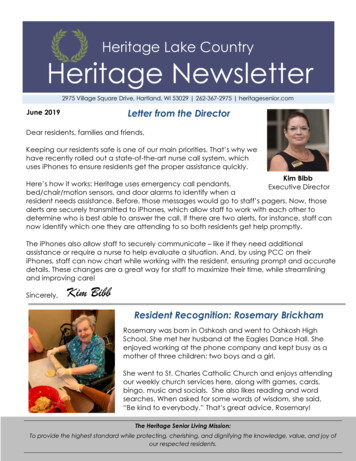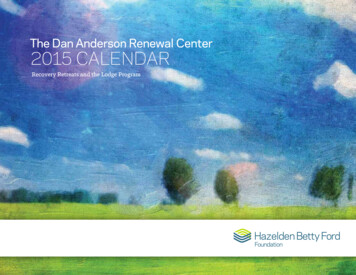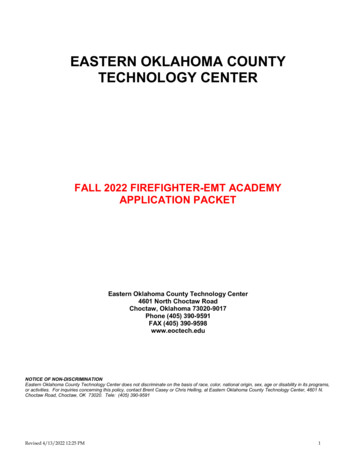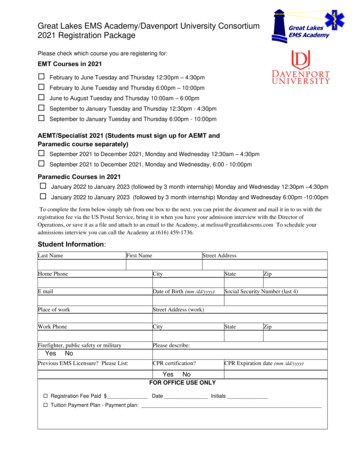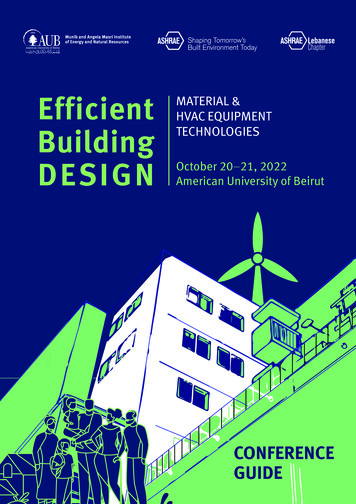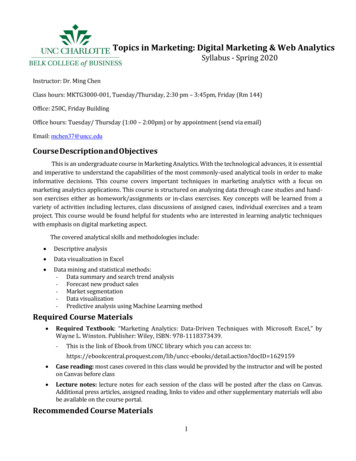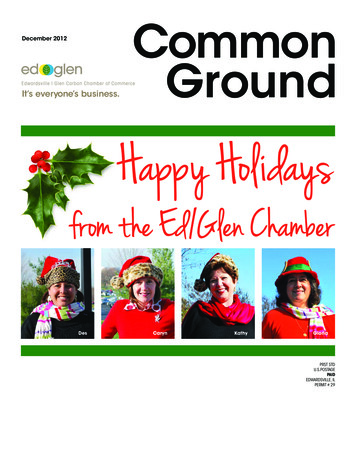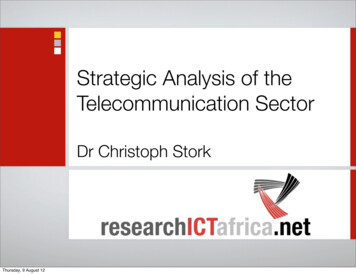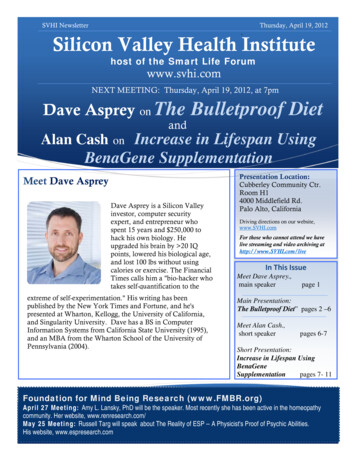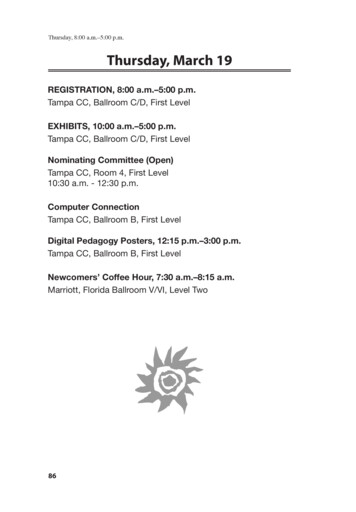
Transcription
Thursday, 8:00 a.m.–5:00 p.m.Thursday, March 19REGISTRATION, 8:00 a.m.–5:00 p.m.Tampa CC, Ballroom C/D, First LevelEXHIBITS, 10:00 a.m.–5:00 p.m.Tampa CC, Ballroom C/D, First LevelNominating Committee (Open)Tampa CC, Room 4, First Level10:30 a.m. - 12:30 p.m.Computer ConnectionTampa CC, Ballroom B, First LevelDigital Pedagogy Posters, 12:15 p.m.–3:00 p.m.Tampa CC, Ballroom B, First LevelNewcomers’ Coffee Hour, 7:30 a.m.–8:15 a.m.Marriott, Florida Ballroom V/VI, Level Two86a1-186-4Cs-2015.indd 861/29/15 9:35 AM
Thursday, 8:30–10:00 a.m.Opening General SessionMarriott, Grand BallroomLevel Two8:30 a.m.–10:00 a.m.Presiding: Joyce Carter, Program Chair/CCCC Associate Chair, Texas TechUniversity, LubbockGreetings: Local Arrangements Chair, Dianne Donnelly, University of SouthFlorida, TampaDouglas Hesse, NCTE President-Elect, University of Denver, COEva Payne, Chemeketa Community College, Corvallis, ORScholars for the Dream—2015 RecipientsCara M. Chang, University of Hawaiʻi at MānoaShenika Hankerson, Michigan State University, East LansingErika T. Johnson, Texas Woman’s University, DentonAshley L. Newby, Michigan State University, East LansingJoy Robinson, Georgia Institute of Technology, AtlantaYanira Rodriguez, Syracuse University, NYSherita V. Roundtree, The Ohio State University, ColumbusJames Chase Sanchez, Texas Christian University, Fort WorthRachel Sanchez, Washington State University, PullmanDawn N. Hicks Tafari, Winston-Salem State University, NCFor a listing of previous Scholars for the Dream winners, please edreamScholars for the Dream Travel Award CommitteeChair:Jessica Barros, Bunker Hill Community College, Charlestown, MADavid Kirkland, Michigan State University, East LansingJaime Armin Mejia, Texas State University, San MarcosOctavio Pimentel, Texas State University, San MarcosSundy Watanabe, University of Utah, Salt Lake CityTo increase the participation of traditionally underrepresented groups—AfricanAmericans, Asian Americans, Mexican Americans, Puerto Ricans and other Latinoand Latina Americans, and American Indians—CCCC has established the Scholarsfor the Dream Travel Awards. The awards celebrate the scholarly contributions offirst-time presenters at CCCC who are members of these groups. By providing somefunding for these scholars to travel to the Conference and to share their work with us,we hope to make the term “underrepresented” past history.CCCC CONVENTION, tampa 2015a1-186-4Cs-2015.indd 87871/29/15 9:35 AM
Thursday, 8:30–10:00 a.m.Chairs’ Memorial Scholarship—2015 RecipientsRachel Bloom, University of Kansas, LawrenceHeather Lindenman, University of Maryland, College ParkShannon Madden, University of Oklahoma, NormanElisabeth L. Miller, University of Wisconsin-MadisonChairs’ Memorial Scholarship Award CommitteeChair:Neal Lerner, Northeastern University, Boston, MACharles Bazerman, University of California Santa BarbaraKeith Gilyard, Penn State University, University ParkRhonda Grego, Midlands Technical College, Columbia, SCScott Wible, University of Maryland, College ParkTo remember and honor the Chairs of CCCC who have passed away, the CCCCExecutive Committee has created scholarships of 750 each to help cover the costsof four graduate students who are presenting at the annual conference. Full-timegraduate students whose presentations were selected through the regular peer reviewprocess are eligible for these scholarships.For a listing of previous Chairs’ Memorial Scholarship Award winners, please shipAnnouncement of the 2014-2015 CCCC Research InitiativeRecipientsAttitudes, Preferences, and Practices of College Writing Instructors Toward DigitalPedagogyRebecca E. Burnett, Rebecca E., Lisa Dusenberry, Andy Frazee, Liz Hutter, and JoyRobinson, Georgia Institute of TechnologyLearning Transfer from Metacognition-Enhancing Writing-about-Writing FYCCourses: A Longitudinal StudyDoug Downs and Mark Schlenz, Montana State UniversityInvestigating the Habits of Mind of First-Year Composition StudentsPeter H. Khost, Stony Brook UniversityWriting in the workplace: An investigation of job requirements and expectations forprofessional writersClair Lauer, Eva Brumberger, and Mark Hannah, Arizona State University88a1-186-4Cs-2015.indd 881/29/15 9:35 AM
Thursday, 8:30–10:00 a.m.Working Class Literacy: Archives, Academic Discourse, and the Achievement ofMeta-Cognitive Academic Literacy SkillsSteve Parks, Jessica Pauszek, and Tony Scott, Syracuse University; William Thelin,University of Akron; Deborah Mutnick, Long Island University; and JenniferHarding, London Metropolitan UniversitySurveying the Status of the Multi-major Professional Writing Course in U.S.Institutions of Higher EducationSarah Read, DePaul University, and Michael Michaud, Rhode Island CollegeFaculty Identity Construction Through LanguageMolly Scanlon, Claire Lutkewitte, Juliette Kitchens, and Allison Brimmer, NovaSoutheastern UniversityDigital Media Academy: Designing Responsive Structures of Graduate StudentProfessionalizationMary P. Sheridan, Rachel Gramer, and Megan Faver Hartline, University ofLouisvilleA Critical Approach to Academic Literacies in Latin America: A Multiple-CaseStudyLina Marcela Trigos Carrillo, University of MissouriResearch Writing in Education: A Genre-based Study of Four DisciplinesAnneke van Enk, Anthony Paré, Catherine Broom, Deirdre Kelly, ClaudiaRuitenberg, and Jennifer Vadeboncoeur, University of British ColumbiaBlended Stretch Writing at Arizona State UniversityJames E. Wermers, Susan Naomi Bernstein, Shillana Sanchez, Karen Dwyer, andConnie J. Bracewell, Arizona State UniversityInvestigating the Impact of First-Year Composition: A Comparative Study on OneCampusLaura Wilder and Robert Yagelski, University at AlbanyThe Transfer of Transfer Project: Extending the Teaching for Transfer WritingCurriculum into Four Sites and Multiple CoursesKathleen Blake Yancey and Erin Workman, Florida State University; MatthewDavis, University of Massachusetts Boston; Liane Robertson, William PatersonUniversity of New Jersey; and Kara Taczak, University of DenverCCCC CONVENTION, tampa 2015a1-186-4Cs-2015.indd 89891/29/15 9:35 AM
Thursday, 8:30–10:00 a.m.Presentation of the Exemplar AwardThis award is presented to a person who has served or serves as an exemplar of ourorganization, representing the highest ideals of scholarship, teaching, and service tothe entire profession.Sharon Crowley, winner of the 2015 CCCC Exemplar Award, will speak.Exemplar Award CommitteeChair: Duane Roen, Arizona State University, TempeDavid Bartholomae, University of Pittsburgh, PAMichael Day, Northern Illinois University, DeKalbGesa Kirsch, Bentley University, Waltham, MASondra Perl, Lehman College, Bronx, NYFor a listing of previous Exemplar Award winners, please 186-4Cs-2015.indd 901/29/15 9:35 AM
Thursday, 8:30–10:00 a.m.Chair’s AddressThursday, 8:30–10:00 a.m.Ain’t No Walls Behind the Sky, Baby!Funk, Flight, and FreedomWhen I think of CCCC as an organization, and of the manynames we use to describe our intellectual work, I imagineCaptain Sisko peering over the Promenade on Star Trek’sDeep Space Nine, looking at the interaction of all kinds ofhuman and extraterrestrial life, and thinking about what itmeans to be charged with the mission of providing and running the hub that stands as the way station at the edge of anincomprehensible vastness of as yet unexplored space. Asan organization, we are a hub for many disparate, yet relatedAdam Banksacademic pursuits. As an academic discipline that refusesUniversity ofto be disciplined, we have long used gateway metaphors toKentuckydescribe our role in the university; we serve as the hub, orLexingtontransit station that has the potential to touch every studentas they make their way in academic work, no matter whatdisciplines or areas of study they might explore. We have long thought about whatit means to be a hub for the intellectual work our students do, inside and outsideacademic walls. We think intensely and attentively about what it means to preparestudents to write and communicate in academic and workplace settings. We have along history of thinking together about writing and communication as keys to ourstudents’ intellectual freedom and internal yearnings. We have also begun to think ascarefully about what it means for students to be able to communicate thoughtfully invarious kinds of community engaged work.But what would it mean to become that kind of hub and network for the rest of theacademy and for the publics and communities we serve off campus? Despite thepolitical and budgetary pressures on higher education in general; despite the uncertainties of how our colleges and universities will respond to this uncertain climate;despite our desires to demonstrate our excellence and rich intellectual history; despite the unjust labor conditions constraining so many of our faculty and programs;despite the injustices contaminating the worlds of so many of our students, we findourselves at a moment when we are freer than we have ever been to fly on to placeswe have never been, to re-vision who we are and the work we are here to do.In this year’s Chair’s Address, “Ain’t No Walls Behind the Sky, Baby! Funk, FlightCCCC CONVENTION, tampa 2015a1-186-4Cs-2015.indd 91911/29/15 9:35 AM
Thursday, 8:30–12:30 a.m.and Futuristic Visions,” I will travel a little through time and space to join CaptainSisko on the DS9 Promenade to look from a different vantage point at the work wedo for our students, for our colleagues in other disciplines across the academy, forhigher education generally, and for communities we have a chance to build with andserve outside our walls. The address will challenge us to be explorers in this momentrather than to be content to stay home and do what we know we do well--to “fly onand reach for the stars” as funkateer Bootsy Collins encourages us to do. The talkwill also identify some specific challenges we must address, and will encourage usto experiment, play, and even fail in our response to these challenges in order for usto drop our limits and fly on to become something different than we have ever been.Adam J. Banks is Professor of Writing, Rhetoric, and Digital Studies at the University of Kentucky. He is the author of Digital Griots and Race, Rhetoric and Technology: Searching for Higher Ground.Nominating Committee (Open)Tampa CC, Room 4, First Level10:30 a.m.–12:30 p.m.92a1-186-4Cs-2015.indd 921/29/15 9:35 AM
Thursday, 10:30–11:45 a.m.A Sessions: 10:30–11:45 a.m.Dialogs on Key IssuesDialog on Cross-Generational PerspectivesBrings together CCCC members to share their perspectives on the historicaland evolving nature of cross-generational networks, institutional and geographical contexts, and work–life balance for professional development and growth.Tampa CC, Ballroom A, First LevelModerators: Louise Wetherbee Phelps, Old Dominion UniversityChristine Tulley, The University of FindlaySpeakers: Cheryl Glenn, The Pennsylvania State UniversityErika Lindemann, University of North Carolina, Chapel HillRenee Moreno, California State University, NorthridgeDonnie Johnson Sackey, Wayne State UniversityOpen Access & Futures: An Undergraduate ResearchPoster SessionJW Marriott, Grand Ballroom Foyer, Third FloorCCCC CONVENTION, tampa 2015a1-186-4Cs-2015.indd 93931/29/15 9:35 AM
Thursday, 10:30–11:45 a.m.A.01Advanced WritingThe Selfie Project: Risk-Taking in First-Year SociologyResearch and WritingIn a 1st year sociology course, we collaborated to integrate student selfiesand online writing into a research paper assignment.Marriott, Florida Ballroom II, Level TwoChair: Boba Samuels, Wilfrid Laurier University, Waterloo, Ontario,CanadaSpeakers: Stefan Todoroff, Wilfrid Laurier University, Waterloo, Ontario,CanadaJordana Garbati, Wilfrid Laurier University, Waterloo, Ontario, CanadaAnne Kelly, Wilfrid Laurier University, Waterloo, Ontario, CanadaKimberly Ellis-Hale, Wilfrid Laurier University, Waterloo, Ontario,CanadaBoba Samuels, Wilfrid Laurier University, Waterloo, Ontario, CanadaA.02Basic WritingProlonging the ALP Effect: A Multi-Pronged Approach toCo-Requisite Enrollment for Developmental WritingStudentsThree professors discuss ways to prolong ALP’s effect on basic writerswith self-placement, study skills, and tutoring.Marriott, Florida Ballroom III, Level TwoChair: Nora Beerline, Rhodes State College, Lima, OHSpeakers: John Fallon, Rhodes State College, Lima, OHJacob King, Rhodes State College, Lima, OHNora Beerline, Rhodes State College, Lima, OH, “Co-Enrollment orCo-Dependence?: Compensating for ALP’s Unhealthy Tendencies”A.03Community, Civic & PublicGender, Service, Support, and Storytelling: The Risks andRewards of Telling a Woman’s War StoryExplores key discourses surrounding contributions and constraints femaleveterans face and challenges moving from combat to campus.Marriott, Meeting Room 10, Level ThreeChair: D. Alexis Hart, Allegheny College, Meadville, PASpeakers: Mariana Grohowski, Bowling Green State University, OH,“Inclusive Interviewing: Sensitive Strategies and Modalities”94a1-186-4Cs-2015.indd 941/29/15 9:35 AM
Thursday, 10:30–11:45 a.m.Brian Hauser, Clarkson University, Potsdam, NY, “Telling the Nontraditional Story: Female Combat Veterans in the Classroom”Lydia Wilkes, Indiana University, Bloomington, “More than ‘Tits andAss’: Metonymy, Personhood, and Female Military-Veteran Identity inKayla Williams’ Iraq War Memoirs”Kathryn Broyles, American Military University, Bartlett, TN, “Reinscribing, Resisting, and Reclaiming Gender”Christina Xydias, Clarkson University, Potsdam, NY, “Telling theNon-traditional Story: Female Combat Veterans in the Classroom”Respondent: D. Alexis Hart, Allegheny College, Meadville, PAA.04Community, Civic & PublicThe Risks of Engagement: Infrastructures of Place-BasedPedagogy in Urban Midwestern ContextsWe develop an ethical community-based pedagogy by engaging withhistory, place, and narrative to generate critical reflectiveness.Marriott, Meeting Room 1, Level TwoChair: Gesa E. Kirsch, Bentley University, Waltham, MASpeakers: Elizabeth Rohan, University of Michigan-Dearborn, “America’sHistorical University Settlement Culture as a Blueprint for Contemporary Place-Based Pedagogy”David Sheridan, Michigan State University, East Lansing, “The Risks andRewards of Storytelling in the Motor City”John Monberg, Michigan State University, East Lansing, “Risks andRewards of Writing Civil Society”A.05HistoryMicrohistories of Composition Studies: The Risks andRewardsThis session applies the methods of microhistory to three events incomposition’s past.Marriott, Meeting Room 11, Level ThreeChair: Bruce McComiskey, University of Alabama at BirminghamSpeakers: Nancy Myers, University of North Carolina at Greensboro, “AMicrohistory of the Internal Workings of the Harvard English Facultybetween the 1870s and 1890s”James Zebroski, University of Houston, TX, “Teaching Grammar toImprove Student Writing? Revising the Bateman-Zidonis Report of1966”Bruce McComiskey, University of Alabama at Birmingham, “Writing the(Micro)History of Composition Studies”CCCC CONVENTION, tampa 2015a1-186-4Cs-2015.indd 95951/29/15 9:35 AM
Thursday, 10:30–11:45 a.m.A.06HistoryThe Emergence of Global Rhetorics: From Local toCosmopolitanThis panel will focus on Jewish, Jesuit, and Buddhist rhetorics. Respondentswill add Afro-Caribbean and Chinese traditions.Marriott, Florida Ballroom V, Level TwoChair: Cinthia Gannett, Fairfield University, CTSpeakers: Kurt Spellmeyer, Rutgers University, New Brunswick, NJ,“Buddhist Rhetoric in East Asia”Deborah H. Holdstein, Columbia College Chicago, IL, “Global Diasporaas Assimilation: Jewish-to-Jesuit Rhetoric and its Implications forComposition”John Brereton, University of Massachusetts, Boston, “Global Rhetoric andthe Jesuits: A Four-Hundred-Year Tradition”Michael Bernard-Donals, University of Wisconsin-Madison, “JewishRhetorics and/as Global Rhetoric”Respondent: LuMing Mao, Miami University, OHVictor Villanueva, Washington State University, PullmanA.07Information TechnologiesMassive Risk, Massive Reward: What We Learned aboutTeaching and Composing by Offering a MOOCConveys how developing and teaching a writing MOOC have impactedour views on pedagogy, collaboration, and composition.Tampa CC, Room 15, First LevelChair: Kaitlin Clinnin, The Ohio State University, ColumbusSpeakers: Cindy Selfe, The Ohio State University, ColumbusBen McCorkle, The Ohio State University at MarionScott DeWitt, The Ohio State University, ColumbusKay Halasek, The Ohio State University, ColumbusKaitlin Clinnin, The Ohio State University, ColumbusRespondent: Jennifer Michaels, The Ohio State University, ColumbusA.08Information TechnologiesComposing Identities: Risks and Rewards of Social Classand Gender Performance in Online SpacesGender performance in online communities where sexed body, e.g.reproduction, motherhood, and gender identity, is explored in writing.Marriott, Meeting Room 2, Level TwoChair: Cindy Tekobbe, Arizona State University-Scottsdale96a1-186-4Cs-2015.indd 961/29/15 9:35 AM
Thursday, 10:30–11:45 a.m.Speakers: Amber Nicole Pfannenstiel, Arizona State University, Tempe,“Constructing ‘Parenting’ on BabyCenter: Mommy Bloggers vsCelebrities”Dawn Opel, Arizona State University, Phoenix, “‘Do you see one line ortwo?’: Home Pregnancy Test Users’ Writing in Online Health Forumsas Negotiation of Risk Communication”Cindy Tekobbe, Arizona State University-Scottsdale, “Asking, Sharing,and Being in Tumblr’s Transgendered Community”A.09Information Technologies“One Does Not Simply Use Memes to Teach Writing!”Locating the Rhetoricity of Memes in the History, Theory,and Technology of Writing StudiesCultural discourse, digital artifact, social genre—memes are ideal to teachwriting, learn rhetoric, and build community.Tampa CC, Room 20, First LevelChair: James Heiman, St. Cloud State University, MNSpeakers: Jack Hennes, Michigan State University, East LansingMatt Barton, St. Cloud State University, MNRex Veeder, St. Cloud State University, MNJames Heiman, St. Cloud State University, MNA.10Institutional and ProfessionalThinking Big on a Small Campus: Innovative Compositionat Regional, Branch, and Satellite InstitutionsSnapshots of WPAs charged with innovative program development atregional/branch campuses plagued by identity and retention crises.Marriott, Meeting Room 7, Level TwoChair: Jessie Blackburn, Appalachian State University, Boone, NCSpeakers: Paul Cook, Indiana University-Kokomo, “Notes from theMargins: WAC/WID and the Institutional Politics of Place(ment)”Heather Bastian, The College of St. Scholastica, Duluth, MN,“Confronting the Challenges of Blended Graduate Education witha WEC Project”Polina Chemishanova, University of North Carolina at Pembroke,“Economies of Place and Power: Lessons from One RegionalUniversity’s Writing-Intensive Initiative”Jessie Blackburn, Appalachian State University, Boone, NC, “RiskingExclusion: WPAs Who Innovate and Differentiate on IsolatedCampuses”CCCC CONVENTION, tampa 2015a1-186-4Cs-2015.indd 97971/29/15 9:35 AM
Thursday, 10:30–11:45 a.m.A.11Institutional and ProfessionalIndependent Writing Departments and Programs:Multiple Perspectives (Sponsored by IndependentWriting Departments and Programs Standing Group)Creating an independent writing department or program can be a risk.Three institutions taking that risk report on their rewards.Marriott, Meeting Room 4, Level TwoChair: Peter Vandenberg, DePaul University, Chicago, IL (SAC 350)Speakers: Stephen Monroe, University of Missippi, University, MSElizabeth Deis, Hampden-Sydney College, VALowell Frye, Hampden-Sydney College, VAAndrea Williams, University of Toronto, Ontario, CanadaRespondent: Barry Maid, Arizona State University, PhoenixA.12Innovation and Taking RisksTaking Risks and Reaping Rewards: Faculty, Students,and WPAs on MultimodalityThis presentation explores the perspectives of faculty, students, and WPAson the risks and rewards of multimodality.Marriott, Florida Ballroom 1, Level TwoChair: Ann-Marie Lopez, McMurry University, Abilene, TXSpeakers: Sonja Andrus, University of Cincinnati/Blue Ash College, OH,“Just because Everyone Else Is Doing It . . . Multimodal ProgrammingMay Seem Like Risky Business for WPAs”Christopher Andrews, McMurry University, Abilene, TX, “Why Risk It?Interdisciplinary Faculty on Multimodal Writing”Ann-Marie Lopez, McMurry University, Abilene, TX, “Writing beyond(the) Margins: Students’ Perceptions of Multimodal Assignments inComposition Classrooms”A.13Innovation and Taking RisksRisky Writing in the STEM Classroom: Exploring theChallenges and RewardsThis panel explores three non-traditional but successful writing pedagogiesemployed in STEM settings.Marriott, Meeting Room 5, Level TwoChair: Paul Hanstedt, Roanoke College, Lexington, VASpeakers: Karen Morgan Ivy, New Jersey City University, Jersey,“Not Just for Numbers Anymore: Practical Applications of Poetry andProse in the Mathematics Classroom”98a1-186-4Cs-2015.indd 981/29/15 9:35 AM
Thursday, 10:30–11:45 a.m.Patrick Bahls, University of North Carolina, Asheville, “Not Just forNumbers Anymore: Practical Applications of Poetry and Prose in theMathematics Classroom”Stacey Vargas, Virginia Military Institute, Lexington, “Exploring Alternatives in the Teaching of Lab Report Writing: The Portfolio Method”A.14Innovation and Taking RisksAcademic Boundaries and Habitual RiskBuilding a map when you don’t know where you’re going: AcademicBoundaries and Habitual Risk, an interactive session at #4c1Marriott, Meeting Room 3, Level TwoChair: Megan Eatman, Clemson University, SCSpeakers: Tekla Hawkins, University of Texas-AustinMegan Eatman, Clemson University, SCMegan Gianfagna, University of Texas-AustinA.15Innovation and Taking RisksTeaching through FailureThree presentations explore how failure is useful for learning.Marriott, Meeting Room 12, Level ThreeChair: Andrew Blake, Delaware State University, DoverSpeakers: Karen Uehling, Boise State University, ID, “Using iPads in aSenior Seminar for Writing Majors: Words Did Not Come Easily”Thomas Batt, Maine Maritime Academy, Castine, “‘Loss Aversion’ and theRisks of Revision”Alicia Brazeau, College of Wooster, OH, “This Might Not End Well:Embracing a ‘Growth’ Attitude toward Failure in Composition”A.16Innovation and Taking RisksComp’s Got Ninety-Nine Problems, but Racial Equity Ain’tOne–The Risky Business of Engaging Racial Equity inWriting InstructionWhite privilege in BW shrinks through portfolios and acceleratedpedagogies; real equity demands ending privilege in many sites.Tampa CC, Room 7, First LevelChair: Kath DeVore, Minneapolis Community and Technical College, MNSpeakers: Renee DeLong, Minneapolis Community and Technical College, MNTaiyon Coleman, Minneapolis Community and Technical College, MNMichael Kuhne, Minneapolis Community and Technical College, MNKath DeVore, Minneapolis Community and Technical College, MNCCCC CONVENTION, tampa 2015a1-186-4Cs-2015.indd 99991/29/15 9:35 AM
Thursday, 10:30–11:45 a.m.A.17LanguageTranslating Translingualism: A Contribution and a Critiqueof the Translanguaging Approach with Translocal CasesThis panel offers a rich description of local and global cases of translanguaging practice and research.Tampa CC, Room 9, First LevelChair: Patricia Fancher, Clemson University, SCSpeakers: Sonja Wang, Michigan State University, East LansingKirk Branch, Montana State University, BozemanAlanna Frost, University of Alabama-HuntsvilleA.18Professional and Technical WritingThe Networked Rhetorical Situation: 3 Case Studies inGenre ChangeThree empirical studies of genre change, presented as evidence of networksacting as situations requiring new social action.Tampa CC, Room 1, First LevelChair: LauraAnne Carroll-Adler, University of Southern California, LosAngelesSpeakers: Kristyne Bradford, Western Illinois University, MacombStephen Carradini, North Carolina State University, RaleighJason Swarts, North Carolina State University, RaleighA.20ResearchWriting Assessment and Research MethodologiesMultimodal online authoring tools, sabermetrics, and scientific approachesexplore writing and program assessment.Tampa CC, Room 5, First LevelChair: Johanna Phelps-Hillen, University of South Florida, TampaSpeakers: Bruce Bowles, Florida State University, Tallahassee,“Moneyball Writing Assessment”Holly Bauer, University of California, San Diego, “Writing ProgramAssessment and the Risks of Scientism”Madeleine Picciotto, University of California, San Diego, “WritingProgram Assessment and the Risks of Scientism”Karyn Hollis, Villanova University, PA, “From Risk to Relevance:A Multimodal Interview with Les Perelman, ‘The Man Who Killed theSAT Essay,’ created with SCALAR, Open Source, Online AuthoringTool”100a1-186-4Cs-2015.indd 1001/29/15 9:35 AM
Thursday, 10:30–11:45 a.m.A.21ResearchLiteracy in Motion: Researching and TeachingMultiliteracies across Scenes of WritingPresents three case studies grounded in mobile theories and researchmethods to explore the practices of writers across space-time.Marriott, Meeting Room 6, Level TwoChair: Brice Nordquist, Syracuse University, NYSpeakers: Tom Fox, California State University, ChicoSteven Fraiberg, Michigan State University, East LansingBrice Nordquist, Syracuse University, NYA.22ResearchResponding to Student Writers: Productively SituatingResponses to Students and Their WritingThree data-based studies of the identities and emotional stances writersand teachers adopt in student writing response contexts.Tampa CC, Room 10, First LevelChair: Pamela Takayoshi, Kent State University, OHSpeakers: Shannon McKeehen, Kent State University, OH, “TeachingNon-Evaluative Peer Response: A Freirean Teacher-ResearcherPerspective”Nicole Caswell, East Carolina University, Greenville, NC, “ReconsiderEmotion: How Emotions Shape Teacher Response to Student Writing”Pamela Takayoshi, Kent State University, OH, “‘I was sounding like anactual writer’: Writerly Identity in Student-Teacher Conferencing”A.23ResearchInventing the Field: Researcher Identity, Dissertations,and Metaphors for InventionResearch reveals the cognitive processes of constructing new researcheridentities.Tampa CC, Room 11, First LevelChair: John David Harding, Saint Leo University, FLSpeakers: Benjamin Miller, City University of New York Graduate Center,Bronx, “Writing is a Subject: Topic-Modeling Dissertationsin Composition/Rhetoric”Jason Wirtz, Hunter College, New York, NY, “Metaphors for Invention:Accomplished Writers Describe Nonconscious Cognition”Rachael Cayley, University of Toronto, Ontario, Canada, “Adopting aNew Research Identity: Implications for the Writing Process”CCCC CONVENTION, tampa 2015a1-186-4Cs-2015.indd 1011011/29/15 9:35 AM
Thursday, 10:30–11:45 a.m.A.24First-Year CompositionBetter Breathers are Better LearnersThis panel explores connections among mindfulness, meditation, and yogawith writing pedagogy to help strengthen student writing.Marriott, Meeting Room 8, Level ThreeChair: Asao Inoue, University of Washington TacomaSpeakers: Emily Beals, California State University, Fresno, “Compassionate Habits: The Implementation of Self-Compassion and MindfulnessMeditation within the Writing Classroom”Jeremiah Henry, California State University, Fresno, “Piecing TogetherPeace: A Grammar and Rhetoric of Mindfulness in the WritingClassroom”Jennifer Consilio, Lewis University, Plainfield, IL, “Transforming Mind,Body and Writing: Incorporating Mindfulness and Yoga into theWriting Classroom”Respondent: Susan Naomi Bernstein, Arizona State University, TempeA.25First-Year CompositionBreaking Down Barriers: Risks and Rewards ofRedesigning FYC Curriculum for the Multilingual RealityThis presentation shares ways we redesigned our FYC curricula to allowstudents to draw on their cultural and language diversity.Tampa CC, Room 12, First LevelChair: Christine Gregory, Florida International University, MiamiSpeakers: Kacee Belcher, Florida International University, Miami,“Entering Global Discourse through a Translingual Lens: HelpingStudents Find Their Voice through a Universal Approach”Enzu Castellanos, Florida International University, Miami, “Rephrasingthe Obvious Questions: Why We Research Ideas instead of Subjects toPush Past the Obvious Answers”Nick Vagnoni, Florida International University, Miami, “From Risk toRewards: Engaging Academic Writing Tasks to Sensitize Students toMultilingualism”Patricia Warman-Cano, Florida International University, Miami, “ProblemSolving with Paulo Freire: Promoting Global Citizenship and Improving Critical-Thinking Skills through Themed, Research-Based Projects”Christine Gregory, Florida International University, Davie, FL, “Redefiningthe Mainstream: Serving a Multilingual Population through UniversalDesign”102a1-186-4Cs-2015.indd 1021/29/15 9:35 AM
Thursday, 10:30–11:45 a.m.A.26First-Year CompositionTaking Risks in Teaching Politics and Ethics in FYCLively discussion about teaching dog-whistle rhetoric, risk, and lying inFYCTampa CC, Room 13, First LevelChair: Maxwell Philbrook, University of Missouri, ColumbiaSpeakers: Stephen Whitley, Collin College, Commerce, TX, “Leap andthe Net Will Appear: Examining Dog-Whistle Rhetoric in the First-YearWriting Classroom”John Hanly, Monmouth University, Frankfort, KY, “Point of No Return?:Rhetoric, Ethics, and Risk in the First-Year Writing Classroom”Kristen Miller, Tuskegee University, LaGrange, GA, “Composing Lies inSearch of Ethos: A Different Sort of Academic Dishonesty”A.27First-Year CompositionGame On: Games and Gamification in First-YearCompositionScholar/Teachers demonstrate the integration of games and gamificationinto FYC as both objects of study and composition artifacts.Tampa CC, Room 14, First LevelChair: Summer Dickinson, Indiana University of PennsylvaniaSpeaker
Rhonda Grego, Midlands Technical College, Columbia, SC Scott Wible, University of Maryland, College Park To remember and honor the Chairs of CCCC who have passed away, the CCCC Executive Committee has created scholarships of 750 each to help cover the costs of four graduate students who are presenting at the annual conference. Full-time
